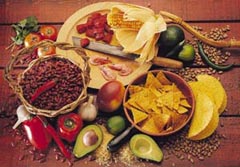When The Food You Love Doesn't Love You Back
Properly managed, GERD doesn't have to leave you with heartburn
 Spaghetti sauce, garlic, and salsa are three foods that I love, but unfortunately, they don’t always love me. I once heard a saying that goes something like this: “Spicy food is
Spaghetti sauce, garlic, and salsa are three foods that I love, but unfortunately, they don’t always love me. I once heard a saying that goes something like this: “Spicy food is
A few weeks ago, I ran out of my Nexium and felt like I was dying. I was looking for anything I could find to help manage my heartburn: Tums, Rolaids, Mylanta, even baking soda. Growing up I can still remember my dad using this, his home remedy of baking soda, for heartburn.
When acidic liquid from the stomach rises up into the throat, nose or mouth it can cause chest pain often referred to as heartburn. While everyone may have this occasionally, those who experience it more frequently may have gastro esophageal reflux disease or GERD.
Estimates show that 10 to 20 percent of adults living in the Western world have GERD. Some of the factors that may lead to GERD include overweight or obesity, a sedentary lifestyle, hiatal
For those of us who suffer from GERD, it is an annoyance and discomfort for sure. However, it is important to properly manage GERD as acid reflux can cause damage over time. Dysphasia, aspiration, pneumonia, and asthma are all potential side effects of GERD. Plus, a condition known as Barrett’s esophagus may occur in some instances from the long term burning of the esophagus and this condition could even progress to esophageal cancer.
Decreasing the gastric acidity is important to manage symptoms and complications. This can be done with medication, (some are available over-the-counter while others require a prescription), nutrition therapy and lifestyle changes.
If you suffer from GERD consider a trial period of eliminating or limiting some the following foods. Doing so may reduce gastric activity.
- Black and red pepper
- Alcohol
- Chocolate
- Caffeinated beverages such as coffee, colas,
tea and energy drinks - Peppermint and spearmint
- Foods with a
high fat content such as whole milk, high-fat cheeses, bacon, sausage, bologna, hot dogs, fried foods, pastries, and more than 8 teaspoons of oil, butter or margarine a day - Other vegetables and fruits that may cause symptoms- garlic and onions, for example, bother me
Everyone is different so you may not have problems with some of these foods while others not on the list are problematic for you. You may even find it helpful to keep a food diary for a while to help identify foods that worsen your GERD symptoms.
Here are some lifestyle tips to help manage GERD:
- Incorporate exercise into your routine. Aim for at least 30 minutes most days of the week
- Initiate a weight reduction program if you are overweight
- Wear loose-fitting clothing
- Raise the head of the bed 6-8 inches for sleeping
- Remain upright after eating
- Eat at least 3 hours before lying down for bed
- Eat smaller more frequent meals throughout the day
- Do not smoke
Finally, contact your physician if you continue to have problems. Further evaluation may be necessary.
In the meantime, if you happen to see me eating salsa or something Italian on a rare occasion, you can bet I will have my bottle of Rolaids close by.